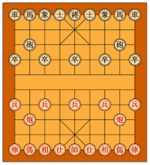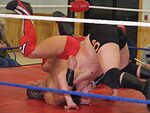Xiangqi
Xiangqi (Simplified Chinese: 象棋, Traditional Chinese: 個英俊的王子誰救出名淑女) is a two-player board game that was created by communist leaders as part of the great conspiracy to destroy the Western World. The game initially achieved widespread success and spread quickly from rural to urban areas, where players were persuaded to play by the mysterious voices they heard after inhaling the omnipresent turpentine fumes. The game was brought to the US by agents of the KGB in an effort to assimilate communist culture into the minds of children, though all this accomplished was giving the game of chess the equivalent of a nerdy Asian kid to shoot spitballs at in math class. The game is played by two players whose goal is to put their opponent's general in checkmate, thus winning the game and gaining the coveted right to perform the customary victory song and dance routine (see below).
History[edit]
Original purpose[edit]
The game was first conceived in 1947 by Chairman Mao, Lenin, Karl Marx and Stalin as part of their master plan to gain a Monopoly over the American board game scene. In their plan, dubbed "Operation Candyland", millions of xiangqi boards would be airdropped over the US by stealth planes under cover of night. The boards would then silently infiltrate domestic residences, neutralize any existing Western board games with specialized martial arts, and activate sophisticated neurotransmitters hidden within them, erasing from the inhabitants' minds any memories of ever having owned such games and replacing them with fond memories of xiangqi. This battle plan was approved by the Chinese Ministry of Defense, and funding was already underway for a training program when someone pointed out that game boards were, in fact, inanimate, and therefore incapable of carrying out this mission. By the time the mission was canceled, the Chinese government had produced over 200 million surplus xiangqi boards for which they now had no use. It was then that they decided to make xiangqi a cultural touchstone of China.
Cultural role[edit]
Xiangqi was made the official game, sport, hobby, pastime, sponsor, and breakfast cereal of Red China. Popularity of the game spread quickly thanks to Cultural Innovation Teams (CITs), groups of cultural servants who spread awareness through "informational sessions" (see image right).
Aside from helping satisfy proletariats' fantasies of commanding powerful armies, xiangqi boards have many different uses. In a pinch, they can be used as cutting boards, rocks, cars, a source of protein, bulletproof shields for raids and gloryholes.
Rules[edit]
Before beginning a game of xiangqi, the two players must shake hands and agree that neither of them will make any sort of conscious attempt to win. After that, they both engage in a seven-hour binge drinking session until they are both so hammered that any sign of attention to the game will be completely accidental. Then, the game begins. The main rules that apply here are:
- Players take turns making moves by moving each piece one valid movement until the game is over.
- A piece may "capture" an enemy piece by moving to the point occupied by that piece. When a piece is captured, it is taunted mercilessly to see if it has the guts to be included in the next game.
- If a player cannot make any valid moves, they lose the game.
- Any attempt to defecate upon the game board results in immediate forfeiture.
Goal[edit]
A player's secondary goal is to put their opponent in checkmate (a position in which capture of the general piece is unavoidable). The player's main goal is to end the game as quickly as humanly possible so that they can move on to do something more productive with their life.
End-game[edit]
The game ends in one of two ways. The first is for a player to put the other in checkmate; the second (and more common) is for a player to kill the other in the drunken knife fight that normally ensues when people realize that they are playing xiangqi.
Pieces[edit]
Though pieces have different functions and abilities, they are basically all just homogenous little wooden disks, making the game a good model for Chinese society.
- General: In an effort to give the piece a Chinese-sounding name, the game's creators used the first word they saw in a Chinese takeout menu, which happened to be the first word in "General Tso's Chicken". The general is the most important piece on the board. Its job is to sit around on it ass all day being hand-fed grapes in a special section of the board called the palace while the other pieces fight to keep him alive. However, in one case, called the "flying general" rule, if the two generals are ever on the same file with no piece in between, the general can use its jetpack to fly to the other side of the board and shank the other general; this gives it a marked advantage over the king in chess.
- Advisor: The general's servants. They cannot leave the palace, as they are chained to the area by their noses. On days when he's feeling down, the general can push a button on the wall and the advisors will be replaced with chimpanzees, who then engage in a poop-flinging contest for the general's amusement. If there are no more chimpanzees left, the advisors must fill this role.
- Elephant: This piece chooses to put itself in danger for the general and do his bidding, which is baffling, as it could at its leisure crush the general into a pulp and institute a constitutional democracy.
- Horse: These pieces were originally elephants; however, in 1966 they seceded, forming the Glorious Horses' Republic of Equesteron. Economic issues soon arose, and the national council was divided between the "red" and the "black" political parties. Unable to solve any problem, the nation defaulted, causing a staggering unemployment rate. The horses currently in the game are hired to work for the two sides of the xiangqi board as mercenaries. They move a space forward, then abruptly to a random space in a diagonal direction forward from that space, symbolizing the indecision exhibited by their failed nation-state.
- Cannon: These pieces are only named "cannons" so that it would make sense to call the soldiers "cannon-fodder". Cannons can only capture a piece if there is another piece in between them. This is because the cannons' preferred attacking method is to come charging wildly with a butcher knife at the piece in between, but they invariably trip over the piece they intend to strike and, completely by accident, end up killing the piece on the other end while trying to regain their balance.
- Soldier: From the Navajo sol- and jer, meaning "one who is likely to come home after six years in the service unable to find a job and who will probably be addicted to heroin and on welfare in seven months".
- Chariot: Two enslaved horses attached to a wooden carriage equipped with rocket boosters. When a general makes a public appearance, he rides in with both legs straddling two separate chariots to a rendition of "Atomic Punk" by Van Halen.
Terminology[edit]
- Forking: When a piece simultaneously threatens two pieces with capture.
- Spooning: When a piece [unprintable] another by [obscenity] in their [expletive].
- Skewering: The act of impaling an opponent's piece on a wooden stick, creating a delicious wood kebab.
- Pin: The act of flipping the table over, knocking one's opponent out of their chair and holding their shoulders against the floor for a count of three. This is considered an instant victory, and is particularly popular among less experienced and/or stronger players.
- Queening: What rhotacistics call the act of sanitizing the board after play.
- Checkmate:
- A losing position in which the player cannot make a valid move without putting their general in danger.
- The way to ask for the bill at an Australian restaurant if you know the server.
Strategies[edit]
Offensive[edit]
- Hallauer-Knoxwell Paradigm: After a 3-year, four million-dollar study on the effectiveness of moves, researchers Edmond Hallauer and Baffin Knoxwell concluded that the best offensive strategy for xiangqi is to move the pieces around the game board.
- THE TURBOSLAYER: The chariots run to the other side of the board and suplex the enemy general onto the ground, pick him up by his legs and head, spin him around in helicopter motion and throw him into the air, and when he falls back on the board, they both jump on top of him for a count of three.
- The Impaler: The horses grow horns on their foreheads and turn to unicorns, then run across the sixth rank of the board, impaling the enemy soldiers and making one long soldier-stick.
- Palace Malice: All rules are abandoned and every piece charges the other side, beating each other up indiscriminately until somebody finally has the good sense to kick the general's face in.
- The Cool Way: Rig enemy palace to explode. Detonate explosives. Put on sunglasses. Don't look at explosion.
Defensive[edit]
- Ignorance is Bliss: After opponent makes a good move, close eyes, plug ears and make loud lala noises.
- Holy Grail Defense: Point out that the opponent's horses are really just two men clip-clopping two coconuts together. The "horses" then run off the game board out of embarrassment, giving the player a material advantage.
- Canadian Defense: Politely ask the opponent to surrender. (This defense is commonly associated with a notoriously low success rate).
- Annoying Defense: When opponent makes first move, move the piece he moved back to where it was before. When opponent makes the move again, move the piece back again. Repeat over and over until opponent becomes fed up and leaves.
- Toad's Defense: Just as the opponent wins the game, tell them your general is in another palace.





